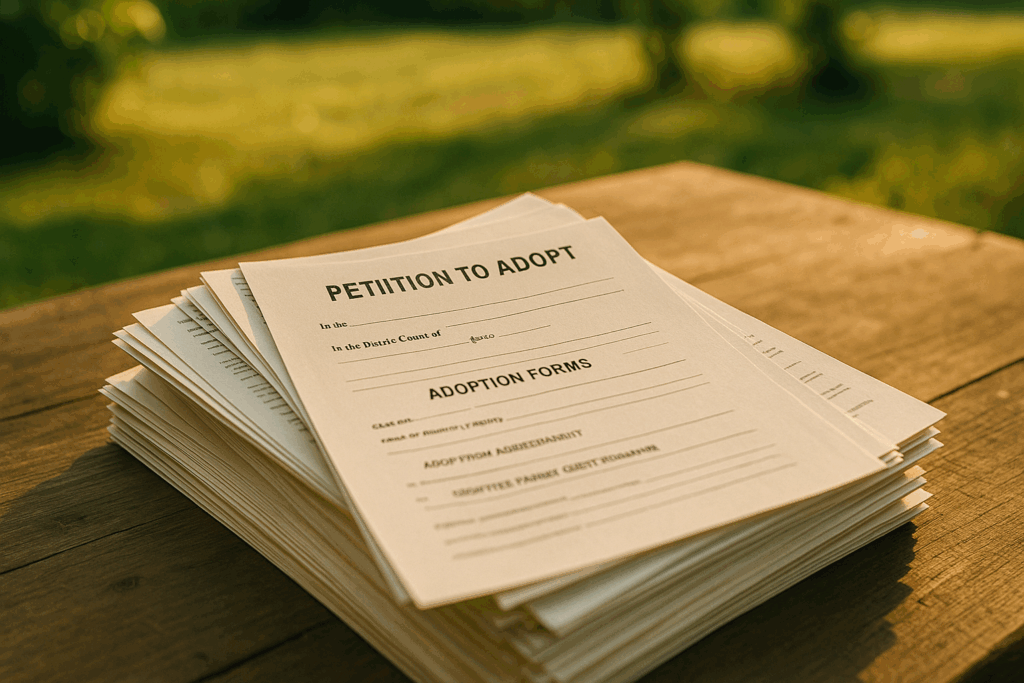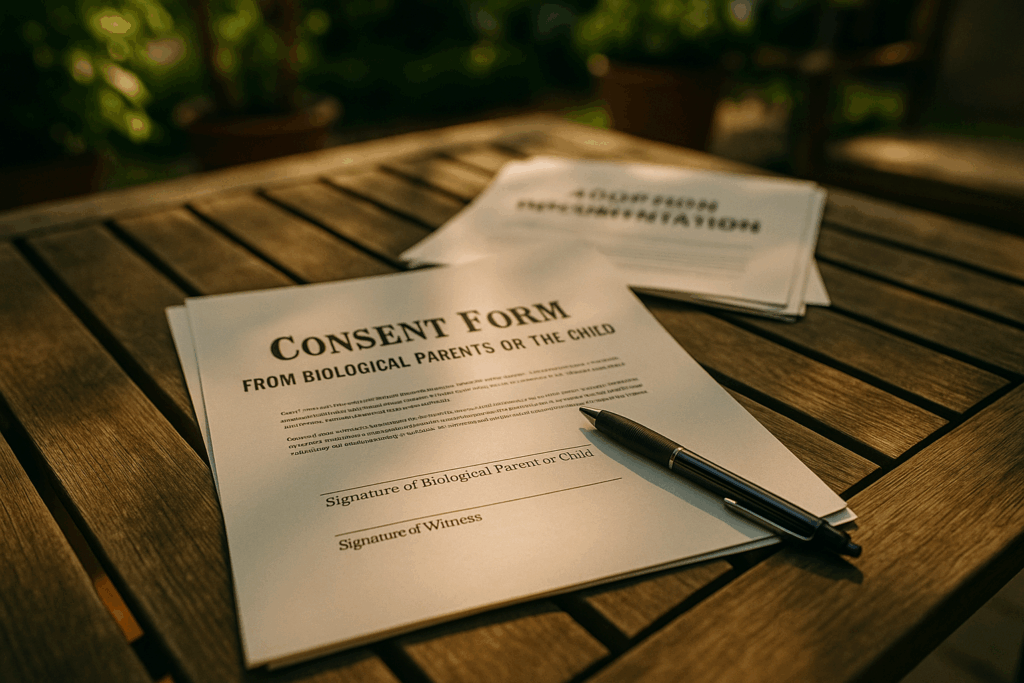
Ever tried assembling a piece of furniture without the instruction manual? You’ve got the screws, the boards, maybe even the tools—but you’re still one confusing diagram away from giving up. That’s what starting the adoption process can feel like without a solid understanding of Texas Adoption Required Documentation—a crucial piece of the puzzle that can either streamline your journey or send you down a path of frustrating delays.
If you’re looking to adopt in Texas, here’s the short answer: yes, the paperwork matters—a lot. From petitions and background checks to consent forms and health records, the documents you gather will shape the outcome of your adoption case. But before you get overwhelmed, take a breath. You don’t have to figure it all out on your own.
This blog is your easy-to-follow guide through the maze of adoption paperwork in Texas. Whether you’re adopting a stepchild, working with an agency, or navigating an international placement, we’re breaking down the what, why, and how of each document—so you can focus on what really matters: growing your family.
Stick around to learn how to avoid costly mistakes, what judges actually look for, and how experienced legal counsel (like the team here at The Law Office of Bryan Fagan, PLLC) can turn a mountain of paperwork into a clear path forward. Because we believe every child deserves a safe home—and every family deserves to know how to get there.
Texas Adoption Process: Key Documents and Steps
- The Texas adoption process involves six key steps, including selecting the adoption type, completing a home study, and filing a petition, all aimed at ensuring the child’s best interests.
- Critical documentation for adoption includes the Petition to Adopt, parental rights termination forms, home study reports, background checks, and health records, which must be completed accurately to prevent delays.
- Legal counsel is essential in the Texas adoption process, helping ensure compliance with laws and accurate documentation, ultimately facilitating a smoother adoption experience.

Your Adoption Journey Starts Here
Don’t navigate the adoption process alone. Schedule a consultation today and receive the expert guidance and support you need to build the family of your dreams.
Overview of the Texas Adoption Process
Adoption in Texas is a deeply personal process rooted in law, compassion, and the best interest of the child. Under Texas Family Code § 162, adoptive parents can become the legal parents of a non-biological child once they meet the state’s eligibility standards. These include being at least 21 years old, demonstrating financial and emotional stability, and successfully completing a home study. Understanding the Texas Adoption Required Documentation from the beginning is essential to avoiding delays and ensuring a smooth journey through the legal system.
The Texas adoption process unfolds in six main steps: choosing the type of adoption, completing a home study, filing a petition to adopt, terminating the biological parents’ rights, undergoing post-placement supervision, and finalizing the adoption in court. Each stage requires specific documentation and careful compliance with legal requirements. For instance, a stepparent adoption may require proof of marriage and consent or court-ordered termination from the other biological parent, while international adoptions often involve immigration paperwork and compliance with international treaties like the Hague Convention.
Different types of adoptions—foster-to-adopt, relative or kinship, private agency, or international—each require tailored documentation. Judges rely on this paperwork, as well as reports and expert evaluations, to determine whether the adoptive placement serves the child’s best interest. As our family law team often reminds clients, courts place strong emphasis on home safety, education, training, and overall readiness—factors outlined in Texas Family Code §§ 162.003–162.008—before granting legal parental rights.
To take the guesswork out of the process, we encourage families to explore our companion resource: The Complete Guide on How to Adopt a Child in Texas. It breaks down timelines, checklists, and what to expect from start to finish. For guidance on related post-adoption matters, like name changes or securing a new birth certificate, visit our blog on finalizing your Texas adoption. At The Law Office of Bryan Fagan, PLLC, we’re proud to provide families with the legal support and clarity they need to move forward with confidence.

Petition to Adopt
In Texas, the Petition to Adopt is one of the most important pieces of Texas Adoption Required Documentation, as it formally initiates the legal process of adoption under Texas Family Code § 162.002. This petition is not just a formality—it’s the document that lays the legal groundwork for establishing a permanent parent-child relationship. To file it properly, prospective adoptive parents must include the completed petition, the child’s birth certificate, proof of a completed home study, background checks, and applicable adoption forms. If the adoptive parents are married, both spouses must sign the petition and include a certified copy of their marriage license to confirm the stability of the relationship.
According to the attorneys at our firm, ensuring accuracy in this initial filing is crucial. Courts rely heavily on the information presented in the petition, including the full names, ages, and relationship status of all parties involved. Any errors, omissions, or incomplete supporting documents can result in delays, requests for clarification, or additional hearings—adding unnecessary stress to an already emotional process. Judges need a complete, clear picture to determine whether the adoption serves the best interest of the child, as required by Texas Family Code § 162.016.
Equally important is the inclusion of the biological parents’ consent or proper legal documentation showing the termination of their parental rights. Texas law requires this documentation to be clear and legally valid, particularly when voluntary consent is involved. For more detailed guidance on this critical component, we recommend reviewing Understanding and Filing Texas Consent to Adoption Forms, which explains the requirements, timing, and legal effect of these forms in depth.
For a deeper understanding of how each phase of the adoption process fits together—including common mistakes to avoid and what to expect at your final court hearing—visit our post on finalizing your Texas adoption. At The Law Office of Bryan Fagan, PLLC, we’re here to ensure that families not only meet the legal requirements, but also feel confident and supported every step of the way.

Termination of Parental Rights Documentation
Before an adoption can proceed in Texas, the biological parents’ parental rights must be terminated. This step is critical as it legally removes a parent’s responsibilities and privileges, allowing the child to be adopted without their consent. Termination can be either voluntary or involuntary. Voluntary termination occurs when a parent believes it serves the child’s best interests and willingly relinquishes their rights. Involuntary termination, on the other hand, requires substantial legal evidence of severe neglect, abandonment, or harm to the child.
The court must show clear and convincing proof that terminating parental rights benefits the child’s welfare. Documentation is required if the biological parents are unavailable or unwilling to consent. Understanding these legal requirements and preparing the necessary documentation can help ensure that this crucial step in the adoption process is completed effectively.
Home Study Evaluations
The home study is one of the most essential elements of Texas Adoption RequiredDocumentation, serving as a detailed evaluation of whether a prospective adoptive home meets the standards outlined in Texas Family Code § 162.003–162.008. As our family law team frequently advises, this process is about more than just checking boxes—it’s about demonstrating that a child will be entering a stable, safe, and nurturing environment. The home study involves a series of steps, including background checks, interviews with the household members, and at least one home visit to assess physical safety and emotional preparedness.
During the home study, a licensed social worker will conduct interviews with the adoptive parents and may also speak with any children or additional adults living in the home. These interviews focus on parenting philosophies, relationships, mental and physical health, and financial readiness. The social worker also inspects the living space to ensure it’s suitable for a child—looking at everything from fire safety precautions to the general cleanliness and organization of the home. All of this information is compiled into a formal report submitted to the court as part of the official adoption record.
Completing the home study is not just a legal requirement—it’s a critical milestone in the adoption process. This comprehensive report helps the judge assess whether adoption is in the child’s best interest, as required by Texas law. Families that approach the home study with honesty and preparation are more likely to receive favorable recommendations and move through the legal process without delay. Using a detailed home study checklist can help ensure no required documents or steps are missed along the way.
For a deeper look at what to expect during this process, we recommend reviewing Stepchild Adoption in Texas: What If the Other Parent Won’t Consent?—which explores how home studies play a role in stepparent adoptions and contested parental rights cases. You can also read our related article on how to prepare for your Texas adoption home inspection to learn practical tips from our legal team. At The Law Office of Bryan Fagan, PLLC, we’re here to walk with you through every step, ensuring your adoption journey is both legally sound and emotionally supported.
Criminal Background Checks and Fingerprint Clearances
Child safety is paramount, so criminal background checks and fingerprint clearances are mandatory for all household members aged 14 and older. The Texas Department of Public Safety conducts both name-based and fingerprint-based checks. The purpose of completing these checks promptly is to avoid delays and ensure the child’s safety.
All required clearances must be updated annually throughout the adoption process to maintain current and accurate records. Fingerprinting appointments are part of the background check process and must be scheduled and completed by all adults living in the adoptive home.
Completing these checks thoroughly and promptly helps streamline the adoption process and enhances safety assessments.
Financial Disclosures
Financial stability is crucial in Texas adoptions. Adoptive parents must provide recent tax returns, pay stubs, and bank statements. Financial transparency helps the court assess the adoptive parents’ ability to meet the child’s needs. There is no minimum income requirement to adopt a child in Texas, but applicants must meet federal poverty level guidelines.
The ideal debt-to-income ratio for financial stability in Texas adoption is under 36%. Documentation used as proof of income includes:
- Pay stubs
- Tax returns
- Business records for self-employed individuals These financial documents help the court determine whether the adoptive parents are financially stable and capable of supporting the child.
Financial statements demonstrate the capacity to support the child. Texas verifies financial resources through the Asset Verification System (AVS). Providing complete and accurate financial disclosures expedites the court’s review and approval of the adoption petition.

Health Records
Health records are crucial for the adoption process in Texas. Adoptive parents must provide:
- Full medical screening
- Physical exams
- Mental health evaluations
- Medical histories
- Recent health statement forms
- Physician letters
- Vaccination records
- Adoption records
These requirements ensure they are physically and mentally capable of caring for a child.
The Health, Social, Education, and Genetic History (HSEGH) report must be submitted prior to the adoption finalization. Thorough medical histories helps match the child with the suitable adoptive family and identify their medical care needs. By providing comprehensive health records, you can help ensure that the adoption process proceeds smoothly and that the child’s welfare and family’s health status are prioritized.
Proof of Residency
Proof of residency is a vital piece of Texas Adoption Required Documentation, as it helps the court evaluate the stability and long-term suitability of the adoptive home. Under Texas Family Code § 102.003(a)(5), a petitioner must generally show that the child has resided in Texas with a parent, guardian, or proposed adoptive parent for at least six months before filing for adoption. In certain circumstances, such as kinship placements or adoptions through the Department of Family and Protective Services, this requirement may be waived if it serves the child’s best interest.
To meet the residency documentation requirements, families typically submit lease agreements, mortgage statements, utility bills, or other official documents that clearly list the adoptive parents’ names and current Texas address. When traditional documentation isn’t available, a sworn affidavit of residency may be accepted, though it’s important that this be prepared in compliance with local court rules and properly notarized to avoid challenges during the adoption process.
As our family law team often advises, providing clear and verifiable proof of residency not only supports your adoption petition but also demonstrates your commitment to providing a stable home environment for the child. Courts place a high value on consistency, particularly when it comes to school districts, community ties, and overall quality of life—factors that align directly with the child’s best interest standard under Texas law.
For situations involving older children, it’s also important to understand the child’s role in the legal process. If the child is age 12 or older, their written consent to the adoption is typically required under Texas Family Code § 162.010(a). To learn more about when and how a child’s consent must be obtained, visit When the Child Must Consent to a Texas Adoption: Key Facts You Need to Know. You can also read our blog on adoption strategies for blended families, which explores how residency and consent issues often come into play. At The Law Office of Bryan Fagan, PLLC, we’re dedicated to guiding Texas families through every legal detail—because when your future is at stake, clarity matters.
Consent Forms from Biological Parents or the Child
Consent is one of the most critical components of the Texas Adoption Required Documentation process, particularly when it involves the voluntary termination of parental rights. Under Texas Family Code § 162.010, a valid consent to adoption must be in writing, verified before a notary, and signed no sooner than 48 hours after the birth of the child. This waiting period ensures that the decision is made with care, not under emotional or physical distress.
In cases where the child is 12 years or older, the law also requires the child’s consent to be included unless the court waives this requirement for good cause. According to the attorneys at our firm, missing or improperly executed consent forms are among the most common reasons for delays in adoption proceedings. Consent must be handled with precision to avoid complications, especially when a biological parent’s willingness—or unwillingness—to relinquish rights is in question.
While these forms may seem straightforward, they carry significant legal weight. Once filed, they serve as binding evidence that the biological parent agrees to the adoption. However, it’s important to note that Texas law allows for the revocation of consent up until the entry of the final adoption decree under specific circumstances, which makes understanding the timing and execution of these documents essential.
For a more detailed breakdown of who must give consent and when exceptions may apply, visit our resource: Who Must Provide Consent to Texas Adoption: Understanding Legal Essentials. You can also explore our guide to terminating parental rights in Texas for insight into how consent ties into this broader process. At The Law Office of Bryan Fagan, PLLC, we’re committed to helping families navigate adoption with clarity, legal accuracy, and the compassionate support they deserve.

Reference Letters
Reference letters, offering insights from individuals who know the prospective adoptive parents, play a significant role. They should include personal anecdotes and observations about the adoptive family’s suitability for parenthood. Friends, family members, or professional colleagues can write these letters, adding credibility to the adoption application.
Effective reference letters strengthen the adoption application by highlighting the positive attributes of the adoptive family. Ensuring that these letters are well-written and submitted on time can enhance the overall adoption process.
Practical Tips for Document Preparation
Preparing for an adoption involves meticulous organization and attention to detail. Creating a documentation checklist helps adoptive parents keep track of all necessary paperwork throughout the adoption journey. Staying organized with a timeline allows adoptive parents to submit documents on time and avoid processing delays.
Maintaining an emergency fund helps cover unexpected costs. Complete, accurate, and up-to-date paperwork, including special circumstances documents depending, can significantly speed up district court proceedings and reduce potential delays.
By following these practical tips, you can help ensure a Successful adoption process and smoother adoption process.
Real Client Stories and Testimonials
At the Law Office of Bryan Fagan, PLLC, we have had the privilege of helping numerous Texas families navigate complex adoption cases through our adoption agency. One client shared how our team provided invaluable support and guidance throughout their adoption journey, ensuring all documentation was completed accurately and on time. This helped them avoid potential delays and achieve a successful adoption.
Another family expressed their gratitude for the personalized attention and compassionate care they received from our legal team. By working closely with them, we were able to address their concerns, streamline the adoption process, and ultimately help them welcome a new family member into their family complete.
These testimonials highlight the importance of having experienced legal counsel to navigate the complexities of the Texas adoption process.

Importance of Legal Counsel
Engaging an experienced adoption attorney ensures all paperwork is filled out accurately and the process complies with relevant laws. An attorney can prevent legal disputes or complications, improving efficiency and accuracy. Courts review consent forms to ensure they meet legal standards and protect the child’s welfare.
Legal representation can make a significant difference. A family law attorney provides expert guidance, helping navigate legal requirements and avoid pitfalls. Skilled legal counsel ensures a smooth, compliant adoption process, securing a brighter future for your adopted child.
Relevant Sections from the Texas Family Code
The Texas Family Code, particularly Chapter 162, provides the legal framework for the adoption process in Texas, including the texas adoption laws. This chapter outlines the rights and responsibilities that come with adoption, establishing a full parent-child relationship between the adoptive parents and the child.
Understanding these legal provisions helps ensure that the adoption process is conducted in accordance with Texas law, protecting the best interests of the child and the adoptive family.
How Missing or Incomplete Paperwork Can Delay Adoption
One of the most common—and avoidable—reasons for delays in the adoption process is incomplete or improperly prepared paperwork. As our family law team often advises, being proactive with your Texas Adoption Required Documentation is key to minimizing stress and ensuring a smoother path to finalization. According to Texas Family Code § 162.003, courts require clear, verifiable documentation to evaluate whether the adoption is in the best interest of the child, and even minor errors can lead to rescheduled hearings and extended timelines.
Inconsistent records, missing consent forms, or incomplete background checks often result in the court requesting additional evidence or clarification. These delays can stretch an already emotional process into months of uncertainty. Using certified copies for essential records—such as birth certificates, parental consent documents, and home study reports—helps maintain legal accuracy and builds the court’s confidence in your readiness to adopt.
Staying organized from the start will not only help you meet legal standards but also reduce the emotional burden on your family. Creating a checklist and maintaining clear copies of all required documents—especially those related to finances, home studies, and medical clearances—can streamline court approval and prevent last-minute surprises. Prompt action on background checks and disclosures is particularly important, as those steps often have processing times beyond your control.
For more detailed guidance on preparing for this process, we recommend reviewing Essential Texas Adoption Answers: Home Study Checklist. You can also explore our blog on navigating a contested adoption in Texas to understand how documentation plays a critical role in more complex cases. At The Law Office of Bryan Fagan, PLLC, we’re committed to helping Texas families get it right the first time—because your future deserves nothing less.

Resources for Further Reading and Assistance
Navigating adoption in Texas can feel overwhelming, but families don’t have to do it alone. In addition to working with an experienced legal team, understanding the available community and state-level resources can make a world of difference. One of the most crucial elements of Texas Adoption Required Documentation is the home study, which evaluates a prospective adoptive family’s readiness and environment. Under Texas Family Code § 162.003, the home study is not optional—it’s a statutory requirement, and its accuracy and completeness carry significant weight in court proceedings.
The Texas Department of Family and Protective Services (DFPS) provides a wide range of resources to guide adoptive parents, including information on adoption subsidies, post-adoption services, and regional contacts. Programs like the Heart Galleries of Texas work hand-in-hand with DFPS and other service providers to help connect children with permanent families, often showcasing children who are harder to place due to age or special needs. These partnerships are invaluable for families looking to adopt from the foster care system.
Families adopting a child with special needs may also qualify for federal and state tax credits, as well as monthly subsidies, to offset the financial responsibilities that come with parenting. These benefits can substantially reduce the long-term cost of adoption and help provide additional support where it’s needed most. Having access to emergency contacts, adoption counselors, and peer support groups can also help adoptive parents feel more equipped and less isolated as they adjust to life post-placement.
For a deeper dive into what the home study process entails, including what documents to prepare and what social workers are evaluating, we recommend reading Top Components of a Texas Adoption Home Study Explained. You can also explore our internal guide on how to prepare for your Texas adoption home inspection. At The Law Office of Bryan Fagan, PLLC, we believe that informed families are empowered families—and we’re here to ensure that every parent feels supported, educated, and prepared throughout their adoption journey.
Conclusion:
Adoption isn’t just about paperwork—it’s about love, stability, and building something lasting. And while those forms, signatures, and official stamps might seem like the “un-fun” part of the process, they’re also what makes your new family real in the eyes of the law. Understanding Texas Adoption Required Documentation is less about red tape and more about protecting the future you’re creating—one where your child can thrive.
If you’re feeling a little overwhelmed, that’s okay. You’re not supposed to have all the answers right away. That’s where we come in. At The Law Office of Bryan Fagan, PLLC, we’ve helped thousands of Texas families navigate this journey with clarity, compassion, and a plan that actually works. Whether you’re just starting to explore adoption or already knee-deep in paperwork, having the right legal guidance can mean the difference between confusion and confidence.
So if you’re ready to turn that mountain of forms into a meaningful new beginning, give us a call or stop by our site to schedule your free consultation. Your family’s next chapter is waiting—and we’d be honored to help you write it.
And hey, if you’ve made it this far, maybe treat yourself to a coffee. You’ve earned it.
Frequently Asked Questions About Adoption in Texas
To adopt in Texas, you must be at least 21 years old, financially stable, and responsible. You’ll also need to complete an application, undergo background checks, participate in a home study, and complete adoption training (especially for foster-to-adopt situations).
Potential disqualifiers include a criminal history involving violence, child abuse, or neglect; failure to complete the home study; or being unable to provide a stable, safe, and nurturing home environment.
The key legal document for adoption in Texas is the Petition to Adopt, which is filed with the court. Additional documents include termination of parental rights orders, consent forms, and the final decree of adoption.
After an adoption is finalized in Texas, a new birth certificate is issued with the adoptive parents’ names. The original birth certificate is sealed and only accessible by court order or through special legal provisions.
In most cases, your husband cannot adopt your child without the biological father’s consent or a court-ordered termination of his parental rights. However, if the biological father has abandoned the child or failed to support them, the court may terminate his rights involuntarily.
The average cost of adoption in Texas varies by type. Private adoptions may cost $30,000–$50,000, while foster-to-adopt through the state can cost little to nothing. Legal and home study fees may still apply in all cases.
Texas doesn’t set a specific income level for adoption, but you must show financial stability and the ability to meet the child’s needs. Courts and caseworkers typically look for a healthy debt-to-income ratio and proof of steady employment.
Common reasons for denial include unresolved criminal records, failure to pass a home study, unstable living conditions, or failure to complete required training and background checks.
Once an adoption is finalized in Texas, the biological parents’ rights are permanently terminated. They cannot regain custody unless the adoption is legally reversed, which is extremely rare and only granted in extraordinary circumstances.
Bryan Fagan is a Texas family law attorney with a heart for adoption—inspired not just by his legal career, but by his own family story. Growing up in Atascocita with two adopted brothers, Bryan learned early the profound meaning of chosen family. His passion for justice was sparked by John Grisham’s The Pelican Brief, and he became the first lawyer in his family, balancing night classes at South Texas College of Law while caring for his grandmother with Alzheimer’s.
Today, Bryan brings that same dedication to his practice, guiding families through adoptions, custody disputes, divorces, and complex marital agreements. A certified member of the College of the State Bar of Texas, he combines elite legal expertise with genuine empathy—drawing from his roles as a husband, father of three, and advocate for families facing false CPS allegations.
Based in Houston, Bryan is actively involved in the Houston Bar Association’s Family Law Sector and statewide family law organizations. Whether finalizing an adoption or protecting parental rights, he believes the law should reflect the deepest values of home, commitment, and love.

